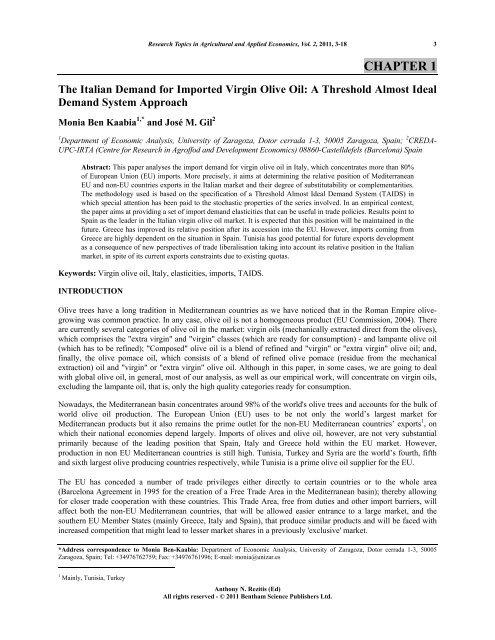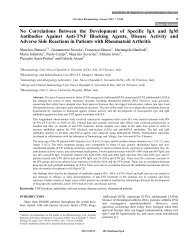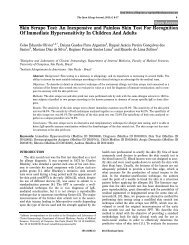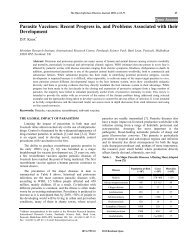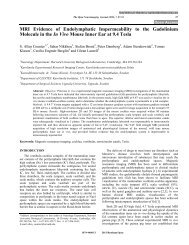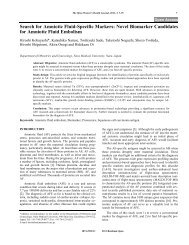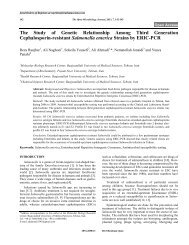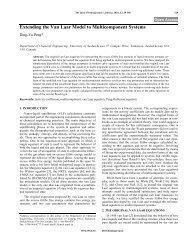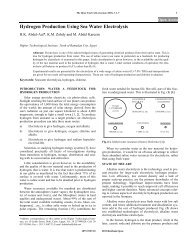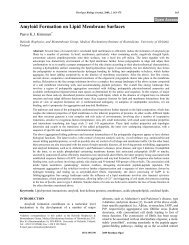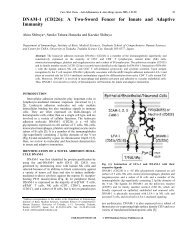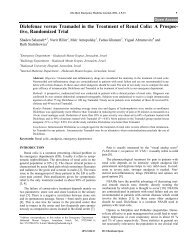chapter 2 - Bentham Science
chapter 2 - Bentham Science
chapter 2 - Bentham Science
You also want an ePaper? Increase the reach of your titles
YUMPU automatically turns print PDFs into web optimized ePapers that Google loves.
Research Topics in Agricultural and Applied Economics, Vol. 2, 2011, 3-18 3<br />
Anthony N. Rezitis (Ed)<br />
All rights reserved - © 2011 <strong>Bentham</strong> <strong>Science</strong> Publishers Ltd.<br />
CHAPTER 1<br />
The Italian Demand for Imported Virgin Olive Oil: A Threshold Almost Ideal<br />
Demand System Approach<br />
Monia Ben Kaabia 1,* and José M. Gil 2<br />
1 Department of Economic Analysis, University of Zaragoza, Dotor cerrada 1-3, 50005 Zaragoza, Spain; 2 CREDA-<br />
UPC-IRTA (Centre for Research in Agroffod and Development Economics) 08860-Castelldefels (Barcelona) Spain<br />
Abstract: This paper analyses the import demand for virgin olive oil in Italy, which concentrates more than 80%<br />
of European Union (EU) imports. More precisely, it aims at determining the relative position of Mediterranean<br />
EU and non-EU countries exports in the Italian market and their degree of substitutability or complementarities.<br />
The methodology used is based on the specification of a Threshold Almost Ideal Demand System (TAIDS) in<br />
which special attention has been paid to the stochastic properties of the series involved. In an empirical context,<br />
the paper aims at providing a set of import demand elasticities that can be useful in trade policies. Results point to<br />
Spain as the leader in the Italian virgin olive oil market. It is expected that this position will be maintained in the<br />
future. Greece has improved its relative position after its accession into the EU. However, imports coming from<br />
Greece are highly dependent on the situation in Spain. Tunisia has good potential for future exports development<br />
as a consequence of new perspectives of trade liberalisation taking into account its relative position in the Italian<br />
market, in spite of its current exports constraints due to existing quotas.<br />
Keywords: Virgin olive oil, Italy, elasticities, imports, TAIDS.<br />
INTRODUCTION<br />
Olive trees have a long tradition in Mediterranean countries as we have noticed that in the Roman Empire olivegrowing<br />
was common practice. In any case, olive oil is not a homogeneous product (EU Commission, 2004). There<br />
are currently several categories of olive oil in the market: virgin oils (mechanically extracted direct from the olives),<br />
which comprises the "extra virgin" and "virgin" classes (which are ready for consumption) - and lampante olive oil<br />
(which has to be refined); "Composed" olive oil is a blend of refined and "virgin" or "extra virgin" olive oil; and,<br />
finally, the olive pomace oil, which consists of a blend of refined olive pomace (residue from the mechanical<br />
extraction) oil and "virgin" or "extra virgin" olive oil. Although in this paper, in some cases, we are going to deal<br />
with global olive oil, in general, most of our analysis, as well as our empirical work, will concentrate on virgin oils,<br />
excluding the lampante oil, that is, only the high quality categories ready for consumption.<br />
Nowadays, the Mediterranean basin concentrates around 98% of the world's olive trees and accounts for the bulk of<br />
world olive oil production. The European Union (EU) uses to be not only the world’s largest market for<br />
Mediterranean products but it also remains the prime outlet for the non-EU Mediterranean countries’ exports 1 , on<br />
which their national economies depend largely. Imports of olives and olive oil, however, are not very substantial<br />
primarily because of the leading position that Spain, Italy and Greece hold within the EU market. However,<br />
production in non EU Mediterranean countries is still high. Tunisia, Turkey and Syria are the world’s fourth, fifth<br />
and sixth largest olive producing countries respectively, while Tunisia is a prime olive oil supplier for the EU.<br />
The EU has conceded a number of trade privileges either directly to certain countries or to the whole area<br />
(Barcelona Agreement in 1995 for the creation of a Free Trade Area in the Mediterranean basin); thereby allowing<br />
for closer trade cooperation with these countries. This Trade Area, free from duties and other import barriers, will<br />
affect both the non-EU Mediterranean countries, that will be allowed easier entrance to a large market, and the<br />
southern EU Member States (mainly Greece, Italy and Spain), that produce similar products and will be faced with<br />
increased competition that might lead to lesser market shares in a previously 'exclusive' market.<br />
*Address correspondence to Monia Ben-Kaabia: Department of Economic Analysis, University of Zaragoza, Dotor cerrada 1-3, 50005<br />
Zaragoza, Spain; Tel: +34976762759; Fax: +34976761996; E-mail: monia@unizar.es<br />
1 Mainly, Tunisia, Turkey


